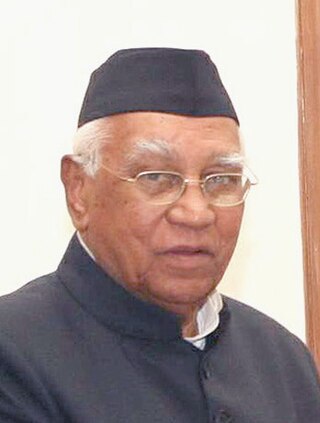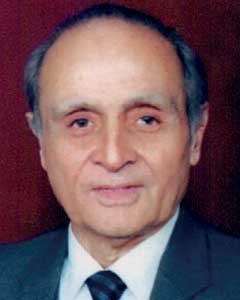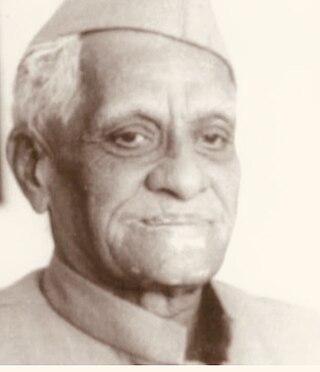Mansoor Hasan | |
|---|---|
| Born | 1938 Aligarh, Uttar Pradesh, India |
| Occupation | Cardiologist |
| Parent | Ajmal Hasan Khan |
| Awards | Padma Shri IMA Certificate of Honour |
| Website | Official web site |
Mansoor Hasan Khan, is an Indian cardiologist, known for his contributions towards the setting up of Lari Cardiology Centre at King George's Medical University, Lucknow. [1] [2] [3] [4] The Government of India honored Hasan in 2011, with the fourth highest civilian award of Padma Shri. [5] [6]
Mansoor Hasan was born in 1938 in Aligarh district, in the Indian state of Uttar Pradesh, in a socially known Pathan family [2] which migrated from the Afghan mountains in the 17th century. [1] His father, Ajmal Hasan Khan, a medical practitioner, was the grand son of Abdul Majeed Khwaja, who co-founded Jamia Millia Islamia and his mother came from the family of the Nawabs of Bhopal. [1] [2] He did his early schooling in Aligarh and completed intermediate examination from the Government College there. [2] His graduate studies were in London which was followed by higher studies at the Royal College of Physicians of Edinburgh from where he obtained the degree of MRCP in 1964. [1] His career began in 1962 at King George's Medical University where he taught till his retirement in 1996 as the Head of the Cardiology department. [2] During a brief interlude, he also had special training in cardiology at London. [1] [2] Post retirement, Hasan is associated with Sahara Hospital, Lucknow. [7]
Mansoor Hasan is a former president of the Cardiological Society of India and a consultant to the Armed Forces of India, Cromwell Hospital, London and Escorts Hospital, New Delhi. [2] He is a member of the Executive councils of Aligarh Muslim University, Jamia Millia Islamia, the University of Kanpur and the University of Lucknow. [2] He is credited with over 50 publications in national and international journals and has guided more than 30 MD students. [2] A recipient of the Certificate of Honour from the Indian Medical Association, Lucknow chapter, [2] Hasan was awarded Padma Shri by the Government of India in 2011, for his contributions to the field of medicine. [5] [2]

Jamia Millia Islamia is a public and research university located in Delhi, India. Originally established at Aligarh, United Provinces during the British Raj in 1920, it moved to its current location in Okhla in 1935. It was given the deemed status by the University Grants Commission in 1962. Jamia Millia Islamia became a central university by an act of the Indian parliament which was passed on 26 December 1988.

Syed Sulaiman Nadvi was a British Indian, and then Pakistani, Islamic scholar, historian and a writer, who co-authored Sirat-un-Nabi and wrote Khutbat-e-Madras.

Mohammad Ajmal Khan, better known as Hakim Ajmal Khan, was a physician in Delhi, India, and one of the founders of the Jamia Millia Islamia university in Delhi, India. He also founded another institution, Ayurvedic and Unani Tibbia College, better known as Tibbia College, situated in Karol Bagh, Delhi. He was the only Muslim to chair a session of the Hindu Mahasabha. He became the Jamia Millia Islamia's first chancellor in 1920 and remained in office until his death in 1927.

Akhlaq Ur Rehman Kidwai was an Indian chemist and politician. He served as Governor of the states of Bihar, West Bengal and Haryana. Also, he worked as Governor of the state of Rajasthan. He was a member of the Rajya Sabha, the upper house of the Indian parliament, from 1999 to 2004. He was awarded the Padma Vibhushan, India's second highest civilian award.

Mahmud Hasan Deobandi was an Indian Muslim scholar and an activist of the Indian independence movement, who co-founded the Jamia Millia Islamia University and launched the Silk Letter Movement for the freedom of India. He was the first student to study at the Darul Uloom Deoband seminary. His teachers included Muhammad Qasim Nanawtawi and Mahmud Deobandi, and he was authorized in Sufism by Imdadullah Muhajir Makki and Rashid Ahmad Gangohi.

Sayed Zahoor Qasim was an Indian marine biologist. Qasim helped lead India's exploration to Antarctica and guided the other seven expeditions from 1981 to 1988. He was a Member of the Planning Commission of India from 1991 to 1996. He was the Vice Chancellor of Jamia Milia Islamia from 1989 to 1991 and an Honorary Professor of universities including Aligarh Muslim University, Madurai Kamaraj University, Anna Malai University, Indian Institute of Technology Madras, and Jamia Millia Islamia. He was awarded the highest civilian awards Padma Shri and Padma Bhushan by the Government of India.
Mushirul Hasan was a historian of modern India. He wrote on the partition of India, communalism, and on the history of Islam in South Asia.

Nawab Mir Akbar Ali Khan was governor of Uttar Pradesh in India from 1972 to 1974 and governor of Odisha from 25 October 1974 to 17 April 1976. He was a member of the Rajya Sabha for 18 years and he was deputy chairperson of the Rajya Sabha for 12 years. He was associated with Osmania University and was a member of the Senates of Aligarh Muslim University, Jamia Millia Islamia and Jawaharlal Nehru University. Later in 1957 he founded a Polytechnic in Hyderabad.
Events in the year 1920 in India.
Mahdi Hasan was an anatomist from Uttar Pradesh, India.
Akhtarul Wasey is an Indian scholar and academician, who serves as the president of Maulana Azad University, in Jodhpur, India. He formerly served as professor of Islamic Studies at Jamia Millia Islamia in New Delhi, where he remains professor emeritus in the Department of Islamic Studies.
Masud Husain Khan was an Indian linguist, the first Professor Emeritus in Social Sciences at Aligarh Muslim University and the fifth Vice-Chancellor of Jamia Millia Islamia, a Central University in New Delhi.
Maqbool Ahmed Lari was an Indian businessperson, philanthropist, Urdu writer, and the founder of All India Mir Academy in Lucknow, Uttar Pradesh, India.
Furqan Qamar is a former vice-chancellor of University of Rajasthan and first vice-chancellor of Central University of Himachal Pradesh. Earlier he was associated with Association of Indian Universities. Professor Furqan Qamar, was the secretary general of the Association of Indian Universities, i.e. the principal executive officer of the largest and one of the oldest network of universities. He has also served as advisor (education) in the Planning Commission of India.
Mohammad Mujeeb (1902–1985) was an Indian writer of English and Urdu literature, educationist, scholar and the vice chancellor of Jamia Millia Islamia, Delhi.

Najma Akhtar is an Indian academic and academic administrator. She served as the Vice Chancellor of Jamia Millia Islamia from 12 April 2019 until 12 November 2023. She is also the first woman to hold the post in JMI. In 2022, she was awarded with Padma Shri by the Government of India.
Mohibbul Hasan was an Indian historian. He wrote books about history of pre-independence India.

Muḥammad Ijteba Nadwi was an Indian Islamic scholar, who formerly headed the Arabic departments of Jamia Millia Islamia, Kashmir University and the Allahabad University.

Abdul Lateef Azmi was an Urdu litterateur and among the close associates of the founders of Jamia Millia Islamia. He joined Jamia Millia as a student of B.A. in 1936 and served the university over 50 years in various capacities. He was one of the longest serving editors of Jamia Millia's official magazine, Jamia. He died in Delhi on May 11, 2002. In 1985, Maktaba Jamia, New Delhi, published a book Abdul Lateef Azmi Hayat-o-Khidmat. Several scholars contributed chapters in the book on various facets of Abdul Lateef Azmi and his life.